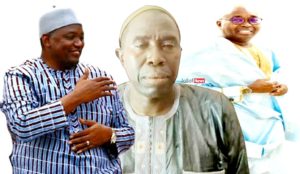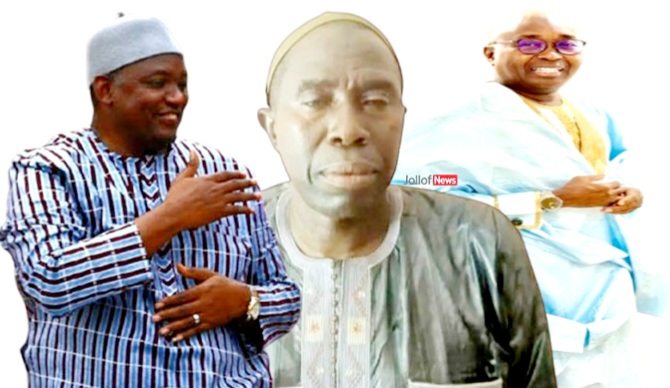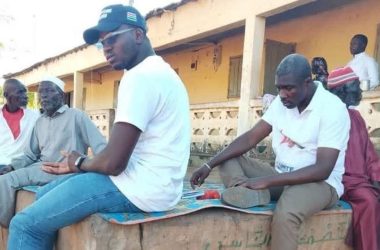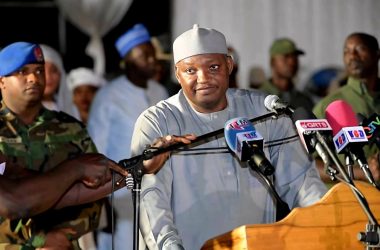UDP’s regional spokesperson Karamo Njie said last week that political analyst Musa Basad Jawara “is out of touch” with Gambian politics, but Jawara fired back on Wednesday, dispelling the notion that “he is a novice in Gambian politics”.
Jawara also lamented that The Gambia is at a critical juncture in need of salvation by an army of Gambian voters.
It would be recalled that Mr. Jawara, a former US State Department official, last week told JollofNews that “all indications are that the ruling National People’s Party, led by the incumbent president, will win the 2026 presidential elections, barring a major upset.” He went on to state that “the opposition parties are in disarray and seem utterly incompetent to defeat the ruling party.” Jawara asserted that the main opposition party, UDP, and its sister political parties will not do the job because they have already failed. “They have tried several elections and failed, and this coming election will not be any different,” he said authoritatively.
This analysis of Jawara’s did not sit well with the UDP’s spokesperson for the North Bank Region Karamo Njie, who later told JollofNews that Jawara “is not in sync with The Gambian politics “because he was probably away in the US for a long time and that the UDP is on the upward trajectory”.
But in a write-up shared with JollofNews on Wednesday evening, Mr. Jawara suggested that he had always been engaged with Gambian politics as he was involved in the process that ushered in the coalition government in The Gambia almost nine years ago.
“With my extensive background in international politics and crisis management, having worked in various capacities in countries such as Kenya during the 2008 political crisis that brought President Kenyatta into office, Cote D’Ivoire in 2010 that brought Allassane Ouattara into power, Libya during the 2011 uprising, I’d also like to dispel the notion that I lack experience in Gambian politics. Notably, I was involved in the process that brought change in The Gambia in 2016,” Jawara explained.
“I might add after working in Sierra Leone helping the country stabilise following a terrible civil war, I was also in a region plagued by rebellion, where I played a role in stabilising the area. Later, I found myself in Senegal in 2012, where I witnessed the country’s presidential elections firsthand. Though I may not seek direct involvement in politics, I possess the knowledge, experience, and vision to excel. If I were to enter the fray, I’d be driven to triumph, leveraging my understanding of the landscape, grasp of political dynamics, and innate potential to conquer the region,” he added.
Jawara is still adamant that the opposition has no prospect of removing President Adama Barrow from office in 2026 unless they coalesce.
“The opposition’s chance of winning this election is zero unless they form a strong coalition with other parties. Without a united front, their efforts will be a joke, and UDP’s prospects will be toast,” he maintained.
Mr. Jawara said the opposition parties need to put aside their differences and fight on a united front “if they hope to have any shot at success”.
“Anything less, and they’re marching straight into a landslide defeat, with their political careers going up in flames,” he warned.
According to him, the current structure of the opposition may not be effective in removing the NPP in the fast-approaching general election.
“Moreover, the electoral registration system used in 2021 will be used again in 2026 without changes, giving the incumbent party an advantage. The Independent Electoral Commission’s chairman has retired, and a replacement has not been found yet. It is critical for this role to be filled by an impartial and competent individual to ensure the integrity of the electoral process,” he postulated.
Mr. Jawara challenged Gambians to take charge and demand for the change they “deserve”.
“The future of our country is in our hands, and it’s time for us to take control and demand the change we deserve. By working together, standing up for our rights, and holding our leaders accountable, we can create a brighter future for ourselves and for generations to come,” Jawara tasked compatriots.
The former senior official of The Gambia’s ministry of economic affairs under Sir Dawda’s administration pointed out that “The Gambia needs a comprehensive approach that synchronizes systemic change, legal reforms, and security reforms to overhaul the existing system”.
“By aligning these elements, the country can potentially create a more stable and accountable governance structure. This integrated approach could be key to driving meaningful progress in The Gambia,” he stated.

Meanwhile, according to Jawara, “the influence of money in Gambian politics has led to questionable decisions, as seen in the 2018 incident where lawmakers received vehicle donations from an anonymous donor, leading to a shift in allegiance and ultimately resulting in the defeat of the draft constitution”. “The draft constitution was defeated after lawmakers who had been elected as UDP members switched allegiance, likely motivated by financial incentives, including the vehicle donations. All in all, UDP had opportunities and they need to acknowledge their own role in this situation. They can’t just point fingers at others,” he stated, adding: “Given this backdrop, it’s likely that financial influence will again play a significant role in the 2026 presidential elections, potentially swaying politicians across the spectrum. For corruption to be effectively addressed, the entire political establishment will likely need to be overhauled. This pattern of influence in the National Assembly dates back to 2018, highlighting a longer-standing issue that needs to be considered when addressing current challenges.”
He went on to state that: “Given this background, I’d like to highlight some key issues and potential solutions for The Gambia. We must prioritize agriculture as the backbone of our economy, ensuring timely payment for farmers’ harvests and providing them with necessary tools and machinery. Stabilizing the currency is also essential to prevent further devaluation and promote economic stability. Furthermore, empowering the judiciary by providing better salaries and incentives for judges can help retain talent and ensure the judiciary functions effectively. Additionally, the entire justice system, including judges, lawyers, and support staff, should be empowered with sufficient remuneration to ensure they work effectively. The telecommunications sector is another vital area that needs urgent attention, and we must consider local ownership and control to retain more economic benefits within the country and prevent capital flight.”.
Jawara said the time for change and to make real the promises of democracy is now.
“Given the current challenges facing The Gambia, it’s crucial that we take bold steps to reform our politics and economy,” he emphasised.






Gambia does not lack talented people to fix it’s numerous issues, what Gambia lacks is people with integrity, who won’t compromise their hereafter for short-lived financial gains by pleasing a leader at the detriment of the entire population. People who are ready to loose friends bt keep to ethical principles of fairness, justice for the good of all. A leader who can look into the eyes of close associates and tell them the truth even if they will turn their back on him/her.
Most, If nt all great leaders who positively n genuinely improved the conditions of their people were once described as hard but hardness by fair n just handling of public resources for the common good no matter what, is better than being seen as ‘soft’ when that softness is endangering the lives of the governed through unchecked abuse of resources resulting in economic hardship, insecurity, failing institutions, inadequate service provision, the list goes on and on …….
Gambia’s problems are to a great extent artificial (the making of dishonest elites/intellectuals enabled innocent majority masses) and not fate.